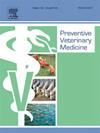A large-scale epidemiological study on the prevalence and risk factors of losses of honey bee colonies during winter seasons in Poland
IF 2.2
2区 农林科学
Q1 VETERINARY SCIENCES
引用次数: 0
Abstract
We conducted a citizen science survey on winter honey bee colony losses in Poland. A total of 2169 beekeepers, possessing 77 867 colonies, reported valid loss rates from all regions of the country between 2017 and 2022. We identified five beekeeping management-related factors and three types of apiaries (small-scale apiaries, medium-scale apiaries, and large-scale apiaries) and analysed their impact on winter bee colony losses. In large-scale apiaries, migration, replacement of queens, and replacement of brood combs were practiced more often than in others. Monitoring and treatment of varroosis were practiced with equal frequency in all apiary types. In total, beekeepers reported 9466 lost colonies, accounting for 12.2 % of the overall winter bee colony loss rate (95 % confidence interval (CI 95 %): 11.4 %–12.8 %). The highest overall winter bee colony losses were reported from the small-scale apiaries (14.8 %, CI 95 %: 13.2 %–16.7 %), followed by large-scale apiaries (11.6 %, CI 95 %: 10.4 %–12.8 %) and medium-scale apiaries (11.4 %, CI 95 %: 10.4 %–12.5 %). The primary category of losses was characterised by the presence of ”dead colonies”, with symptoms that could be linked to either colony depopulation syndrome or starvation. All management-related factors contributed to the lower winter bee colony loss rates, but the relationships were mainly mild, complex, and highly dependent on the type of apiary.
对波兰冬季蜂群损失的流行率和危险因素进行了大规模流行病学研究。
我们在波兰进行了一项关于冬季蜂群损失的公民科学调查。共有2169名养蜂人,拥有77867个蜂群,在2017年至2022年期间报告了该国所有地区的有效损失率。我们确定了五个养蜂管理相关因素和三种类型的蜂房(小型蜂房、中型蜂房和大型蜂房),并分析了它们对冬季蜂群损失的影响。在大规模的养蜂场,迁徙、更换蜂王和更换巢梳的做法比其他地方更频繁。在所有蜂房类型中,监测和治疗静脉曲张的频率相同。养蜂人总共报告了9466个蜂群损失,占整个冬季蜂群损失率的12.2 %(95% %置信区间(CI 95 %):11.4 %-12.8 %)。最高的整体冬天蜜蜂殖民地损失报告小规模砌的(14.8 %,CI 95 %:13.2 % -16.7 %),其次是大规模砌(11.6 %,CI 95 %:10.4 % -12.8 %),中等规模的砌(11.4 %,CI 95 %:10.4 % -12.5 %)。第一类损失的特点是出现“死亡的蜂群”,其症状可能与蜂群人口减少综合症或饥饿有关。所有与管理相关的因素都导致了冬季蜂群损失率的降低,但其关系主要是温和的、复杂的,并且高度依赖于蜂房的类型。
本文章由计算机程序翻译,如有差异,请以英文原文为准。
求助全文
约1分钟内获得全文
求助全文
来源期刊

Preventive veterinary medicine
农林科学-兽医学
CiteScore
5.60
自引率
7.70%
发文量
184
审稿时长
3 months
期刊介绍:
Preventive Veterinary Medicine is one of the leading international resources for scientific reports on animal health programs and preventive veterinary medicine. The journal follows the guidelines for standardizing and strengthening the reporting of biomedical research which are available from the CONSORT, MOOSE, PRISMA, REFLECT, STARD, and STROBE statements. The journal focuses on:
Epidemiology of health events relevant to domestic and wild animals;
Economic impacts of epidemic and endemic animal and zoonotic diseases;
Latest methods and approaches in veterinary epidemiology;
Disease and infection control or eradication measures;
The "One Health" concept and the relationships between veterinary medicine, human health, animal-production systems, and the environment;
Development of new techniques in surveillance systems and diagnosis;
Evaluation and control of diseases in animal populations.
 求助内容:
求助内容: 应助结果提醒方式:
应助结果提醒方式:


